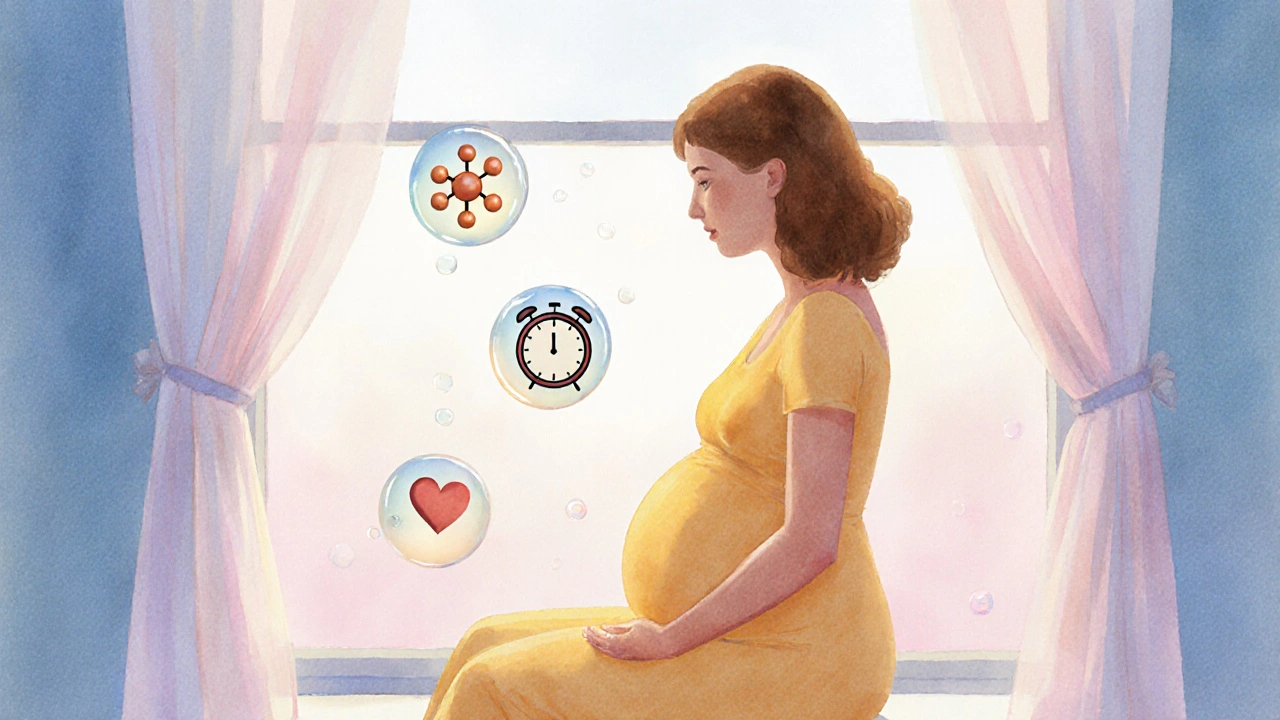Pregnancy & Postpartum Libido: Understanding and Coping
Hormonal Fluctuations
Estrogen, progesterone, and testosterone levels shift dramatically during pregnancy and postpartum, often reducing sexual desire.
Physical Discomfort
Body changes like swelling, tenderness, and vaginal dryness can make intimacy less appealing or uncomfortable.
Body Image Concerns
Changes in appearance can impact self-perception and confidence in intimate moments.
Stress and Fatigue
New parenthood brings high stress and sleep deprivation, which significantly impact libido.
Additional Lifestyle Tips
- Schedule Intimacy: Treat it like any other appointment-just 15-20 minutes can be enough.
- Sensual Touch: Focus on sensual touch rather than performance; think of it as a way to release oxytocin.
- Nutrition: Stay hydrated and eat balanced meals; blood sugar dips can dampen arousal.
- Post-Feeding Care: If breastfeeding, express milk before intimacy to reduce discomfort.
When many expect a surge of intimacy, Decreased sexual desire during pregnancy and postpartum is a common, often misunderstood experience. It refers to a reduced interest in sexual activity that can begin early in pregnancy and continue after the baby arrives.
What the change feels like
Most people notice a shift somewhere between the first and third trimester. The feelings range from occasional loss of interest to a persistent drop in libido that lasts weeks or months. Some describe it as an "off" button that seems to stay pressed. After delivery, the pattern can either bounce back quickly or linger, especially if recovery is slow or complications arise.
Why it happens: the hormone roller‑coaster
Pregnancy brings a tidal wave of hormones. Estrogen and progesterone surge to support the growing baby, while prolactin prepares the body for milk production. These shifts can dull sexual arousal pathways in the brain. Hormones such as testosterone, which fuels desire, often dip during the second trimester and may stay low for weeks after birth.
In the postpartum period, the body faces another hormonal reset. Prolactin stays high to sustain lactation, and cortisol spikes in response to the stress of caring for a newborn. Both can suppress the libido that was already muted.
Physical changes that matter
Beyond hormones, the body undergoes noticeable transformations. The abdomen expands, breasts become tender, and blood flow shifts to the uterus and placenta. These changes can make touch feel uncomfortable or even painful. Vaginal dryness, especially if breastfeeding, adds another layer of friction that discourages intimacy.
Recovery from a C‑section or tearing can also limit movement and cause anxiety around certain positions. Even simple things like a swollen belly can make previous favorite positions feel impossible, prompting a mental block that reduces desire.
Body image and self‑perception
How you see yourself plays a huge role. Many people report feeling "less sexy" as their weight changes or stretch marks appear. The sudden shift from a pre‑pregnancy silhouette to a rounder figure can trigger self‑consciousness. When you’re constantly checking yourself in the mirror, it’s natural for desire to slip.
Positive reinforcement helps. Wearing clothes that make you feel comfortable, focusing on the strength your body shows, or simply acknowledging the miracle of creating life can turn a negative narrative into a source of pride.

Stress, fatigue, and sleep loss
Newborns don’t adhere to a 9‑to‑5 schedule, and night feeds can rob you of restorative sleep. Chronic fatigue erodes the mental bandwidth needed for intimacy. Add to that the endless to‑do list-appointments, feeding schedules, household chores-and you have a perfect storm for low desire.
Stress hormones like cortisol not only blunt arousal but also raise the threshold for pleasure. When the brain is in survival mode, erotic signals get pushed aside.
Relationship dynamics and communication
Couples often navigate a new identity as parents. Relationship dynamics shift from "dating" to "co‑parenting," and the balance of emotional labor can feel uneven. If one partner feels unheard, resentment builds, further dimming desire.
Open, non‑judgmental communication is a lifeline. Talking about fears, preferences, and limits creates a safe space where intimacy can evolve rather than disappear.
Practical coping strategies
Below is a quick‑reference guide that aligns common causes with actionable coping tips.
| Common Cause | Practical Coping Strategy |
|---|---|
| Hormonal fluctuations | Discuss timing with your doctor; consider safe herbal support like fenugreek (if breastfeeding) |
| Physical discomfort | Use pillows for support, explore new positions, apply water‑based lubricants |
| Body image concerns | Practice mirror affirmations, schedule "you time" for self‑care, wear clothing that feels good |
| Stress and fatigue | Take short power naps, delegate chores, try guided relaxation before intimacy |
| Relationship tension | Set a weekly "talk‑date" without baby, use “I feel” statements, celebrate small wins |
| Lack of desire after birth | Start with non‑sexual contact-cuddling, massage, eye contact-to rebuild connection |
Additional lifestyle tweaks can help keep the spark alive:
- Schedule intimacy like any other appointment-just 15‑20 minutes can be enough.
- Focus on sensual touch rather than performance; think of it as a way to release oxytocin.
- Stay hydrated and eat balanced meals; blood sugar dips can dampen arousal.
- If breastfeeding, express milk before intimacy to reduce discomfort.
When to seek professional help
If low desire persists beyond six months postpartum, or if it’s accompanied by depression, anxiety, or relationship conflict, consider reaching out to a specialist. Medical advice from an OB‑GYN, a therapist trained in sexual health, or a certified lactation consultant can pinpoint underlying issues and suggest evidence‑based treatments.
Therapies may include: low‑dose estrogen patches (if not breastfeeding), counseling for body image, or couples therapy focused on intimacy rebuilding. The key is to address both the physical and emotional side of the equation.
Key takeaways
- Hormonal shifts, physical changes, stress, and body image all combine to lower desire.
- Open communication and small, non‑sexual connections can revive intimacy.
- Practical tools-from pillow support to scheduled cuddle time-make a real difference.
- Professional help is valuable if the dip lasts longer than six months or hurts mental health.

Frequently Asked Questions
Is it normal for desire to disappear completely?
Yes, many couples report periods of almost no interest in sex, especially in the third trimester and early weeks after birth. The body is prioritizing survival and infant care, so libido can drop dramatically.
Can I take medication to boost libido while breastfeeding?
Some physicians prescribe low‑dose testosterone gels or herbal supplements like maca, but safety varies. Always discuss with a healthcare provider before starting any product.
What are quick ways to feel more aroused during a night‑feed?
Try a brief skin‑to‑skin cuddle right after feeding, dim the lights, play soft music, and focus on breathing together. The oxytocin from close contact can trigger a subtle desire surge.
How can I address body image issues without feeling self‑conscious?
Start a gratitude journal that lists what your body can do-carrying a baby, healing after delivery, producing milk. Pair this with supportive friends or a therapist who can reinforce positive self‑talk.
Should I avoid sex if I had a C‑section?
Most doctors recommend waiting about six weeks for incision healing, but gentle touch and kissing are fine earlier if you feel comfortable. Always follow your surgeon’s specific guidance.

Pregnancy really rewires the brain's reward system, so it's natural that desire dips. Hormones like progesterone act like a dimmer switch for libido, and the body is prioritizing the baby. If you view this shift as a temporary trade‑off rather than a failure, it can reduce anxiety. Gentle communication with your partner about the new boundaries helps keep the emotional connection alive. Remember, the spark often returns once sleep improves and the hormonal roller‑coaster settles.
I think pharma just wants to sell you pills.
There is a cascade of hormonal changes that begins almost the moment conception is confirmed and it does not stop abruptly after delivery. Estrogen rises to support uterine growth and then falls, which can mute the arousal pathways in the brain. Progesterone follows a similar pattern and its calming effect can be beneficial for fetal development but can also dampen sexual interest. Prolactin spikes to prepare for lactation and it is known to suppress libido in many new mothers. Cortisol levels increase as the body deals with the stress of a new infant and high stress hormones are antithetical to desire. Physical discomfort such as a growing belly or sore breasts adds a layer of aversion to intimate contact. The pelvic region experiences increased blood flow that is directed toward the uterus rather than the genitals. Vaginal dryness can become more pronounced especially if breastfeeding because estrogen levels stay low. Recovery from a C‑section or tears can limit movement and create fear of pain during intercourse. Body image shifts dramatically as weight changes, stretch marks appear and the silhouette is altered which can lead to self‑consciousness. Social expectations often suggest that a couple should be more sexual after a baby, yet the reality is the opposite for many. Sleep deprivation cuts the brain’s reward response and makes any effort feel exhausting. Couples who keep the lines of communication open are able to navigate the shift more smoothly because they can negotiate new forms of intimacy. Simple touches such as hand‑holding, cuddling, or a gentle massage can release oxytocin and signal safety. Scheduling short intimacy windows can reduce performance anxiety and make the experience feel more manageable. Professional help is advisable if the loss of desire extends beyond six months or is accompanied by depression. Understanding that desire is a fluid state helps both partners to be patient and supportive.
Honestly I think you should also consider how the partner’s own stress might be affecting the whole situation. Many couples forget that the dad can feel left out and that adds tension. It might help to share a night where you both just relax together without any expectations.
The ebb and flow of desire during pregnancy reads like a tragic opera, each movement swelling and receding with hormonal tides. Yet within this somber aria lies the potential for a renewed duet, if both participants listen to the subtle crescendos of affection. Practical measures such as pillows and lubricants become the stage props that enable a graceful performance. Communication, delivered with the decorum of a seasoned diplomat, transforms whispering doubts into a chorus of mutual support. In the end, the curtain rises on a new act where intimacy is redefined rather than extinguished.
America knows how to handle this and we dont need foreign advice.
Got to say, the advice about using pillows and scheduling cuddle time actually works – it’s low effort and high reward 😊
While your prose is undeniably eloquent, you might consider replacing “somber aria” with “solemn aria” for a more precise metaphor; likewise “cushions” should be pluralized as “pillows”; nevertheless, the underlying advice is sound and worth sharing.
The hormonal surge, the physical discomfort, the shifting body image, the relentless fatigue, and the altered relationship dynamics all converge, creating a perfect storm, that can smother desire, but recognizing each factor, individually, can empower couples, to address them, one by one.
It’s really quite common for new parents to feel like their sex drive has taken a vacation, especially when the baby is crying at 2 a.m. and you’re running on coffee, the body’s hormone levels are all over the place, and you might not even remember the last time you had a proper night’s sleep. Adding to that, the physical changes after birth, whether a C‑section or a perineal tear, can make certain positions feel uncomfortable or even painful. Some people find that using a water based lube, and a few strategically placed pillows, can make the experience much more pleasant. Others suggest that a brief cuddle session, with no expectations, can release oxytocin and subtly increase arousal. It’s also helpful to schedule intimacy like a doctor’s appointment, because it forces you to carve out time in a chaotic schedule. If you’re breastfeeding, expressing milk beforehand can reduce nipple sensitivity and make the experience more enjoyable. Over time, as sleep improves and the hormonal roller‑coaster levels out, many couples report a gradual return of desire.
Indeed, the systematic approach you outlined reflects a commendable synthesis of physiological insight and pragmatic strategy, and it underscores the necessity for couples to adopt a proactive stance rather than a passive resignation; thus, by instituting scheduled intimacy, employing appropriate adjuncts such as lubricants, and addressing breastfeeding‑related sensitivities through pre‑emptive expression, partners can methodically reconstruct their sexual rapport while simultaneously nurturing the nascent familial bond.
Remember, every couple writes their own love story, and the chapters about pregnancy are merely plot twists; keep the dialogue open, celebrate small victories, and don’t hesitate to seek guidance from a therapist or a trusted community when you need an extra pen.